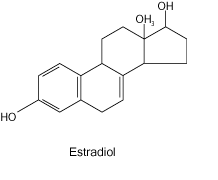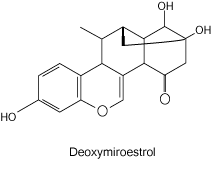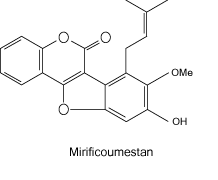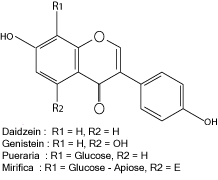Pueraria Mirifica Composition: Active Ingredients and Benefits
The Potent Compounds in Pueraria Mirifica
Pueraria Mirifica (also known as White Kwao Krua) stands out among phytoestrogen-rich plants due to its unique and highly potent compounds—miroestrol and deoxymiroestrol. These active ingredients closely resemble human estrogen (estradiol) in structure, giving them superior estrogenic activity compared to isoflavones found in soy or alfalfa.
Key Compounds in Pueraria Mirifica
- Miroestrol & Deoxymiroestrol: Discovered in the 1940s and 2000 respectively, these are the primary phytoestrogens in Pueraria Mirifica. Deoxymiroestrol is believed to be the original compound, which oxidizes into miroestrol. Both exhibit strong estrogenic effects due to their similarity to estradiol.
- Isoflavones & Coumestans: Includes genistein, daidzein, daidzin, genistin, and coumestrol—also found in soybeans. However, Pueraria Mirifica’s potency is much higher due to the miroestrol group.
Health Benefits of Pueraria Mirifica’s Composition
- Hormonal Balance: Supports natural estrogen levels in women, especially during menopause.
- Anti-Menopausal Effects: Reduces hot flashes, vaginal dryness, and mood swings.
- Anti-Aging: Enhances collagen production and improves skin elasticity.
- Cancer Prevention Potential: May reduce risk of hormone-related cancers.
- Cardiovascular Support: Helps lower cholesterol, promoting heart health.
With its rich phytoestrogen profile—especially miroestrol and deoxymiroestrol—Pueraria Mirifica is one of the most potent natural compounds for hormone and skin health.
Chromene, Isoflavonoid, and Coumestan Derivatives in Pueraria Mirifica
| Chromene | Isoflavones | Isoflavone Glycosides | Coumestans |
|---|---|---|---|
| Miroestrol | Daidzein | Daidzin | Coumestrol |
| Deoxymiroestrol | Genistein | Genistin | Mirificoumestan |
| Kwakhurin | Mirificin | Mirificoumestan Glycol | |
| Kwakhurin Hydrate | Puerarin | Mirificoumestan Hydrate | |
| Puerarin-6” Monoacetate |
Chemical Structures of Active Compounds

Estradiol
→

Deoxymiroestrol
→

Mirificoumestan
→

(Related Compound)
Source: Medicinal Plant Research Institute, Ministry of Public Health, Thailand (July 2000)

